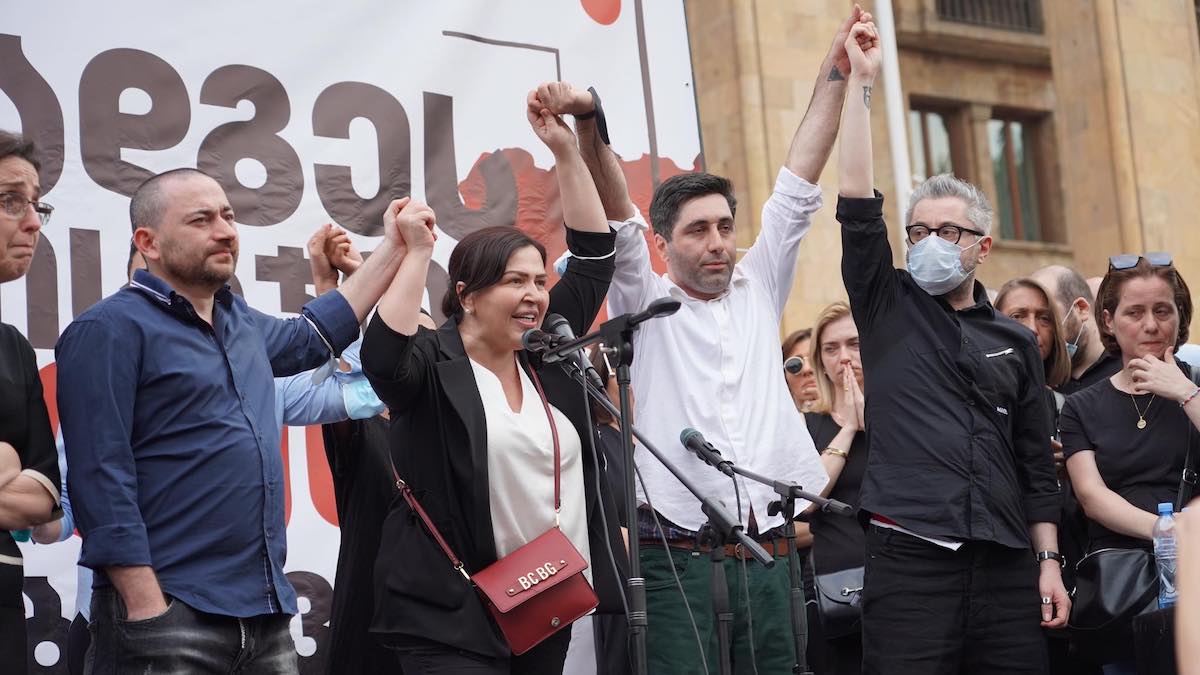Georgian court sentences 6 people for up to 5 years on charges over July 5 violence
Participants of July 5 violence sentenced by Tbilisi City Court
A court in Tbilisi sentenced those responsible for the attack on journalists during a pogrom in the center of Tbilisi on July 5, 2021 to various prison terms.
Six people were detained on charges of assaulting Pirveli TV cameraman Lekso Lashkarava, who died a few days after the beating: David Kutaladze, Otar Gelashvili, Tsotne Chikhladze, Gia Giguashvili, Tornike Davlasheridze and Akaki Nakashidze. All six were found guilty and sentenced to five years in prison.
The verdict was announced today on other episodes of the July 5 violence.
The judge found guilty those responsible for attacks on Rati Tsverava, a journalist with Formula TV, as well as Dea Mamiseishvili and Datuna Akhaladze, journalists of the Main Channel, Dito Krimlishvili and Shota Kervalishvili, journalists of Tabula and Maka Radi Jabua, journalists of Tabula – as well as Radio Liberty journalist Tornike Mandaria and cameraman Dato Koridze and Rustavi 2 cameraman Beka Atabegashvili.
Some were sentenced to three years in prison, others to one year and three months in prison.
Both journalists and representatives of radical movements who support the defendants gathered near the court building. The police were mobilized on the spot.
What happened July 5th
On July 5, 2021, the March of Dignity was to be held in Tbilisi as part of Tbilisi Pride Week. The march to the Rustaveli metro was scheduled for 18:00. However, the church soon announced the start of its own action against the march. It called on its supporters to take to the streets and defend the country from a “perverted way of life”.
On the morning of July 5, homophobic groups marched towards the parliament. First, they smashed opposition tents that had been standing in front of the parliament building for months, and then attacked journalists who had come to cover the event. On July 5, there was a real hunt for media representatives in Tbilisi – radical groups attacked 53 journalists.
According to observers, the criminals’ actions were provoked by Prime Minister Garibashvili’s July 5 statement. He blamed the possible aggravation of the situation not on the participants of the violent rally, but on the organizers of the March of Dignity.
- The history of Georgia’s LGBT+ community’s struggle for equal rights and non-discrimination
- Media hunted: Over twenty reporters injured during anti-Pride rally in Tbilisi
According to journalists, an insufficient number of police officers were mobilized on the spot during the day. The rioters attacked cameraman Lekso Lashkarava and his colleague, TV Pirveli journalist Miranda Bagaturia in the office of the Shame Movement.
According to Bagaturia, Lashkarava was beaten by 20 people. Eyewitnesses say that priests were among the attackers.
Lashkarava was taken to the hospital with a fractured facial bone that required surgery. He left the clinic three days later. The day before his death, on June 10, he was a guest on the daily Pirveli TV program, where he recalled the events of July 5.
On July 11, Lashkarava’s mother found him dead in his own bed.
Family members say that Lashkarava had a nosebleed. One of the versions of relatives says that he died of thromboembolism as a result of his injuries.
The body of the young man was submitted for examination by forensic experts without the consent of the family. The body of a man wrapped in a blue jacket, without a stretcher, was carried out of the house and jogged to the car. This treatment of the deceased has become another cause of public discontent and the subject of discussion on social media.
The Ministry of Internal Affairs launched an investigation into the incident under the article of incitement to suicide. Shortly after Lashkarava’s death, government-affiliated websites began spreading the word that Lashkarava had become addicted to drugs and had died of an overdose.
On the evening of the same day, July 11, a briefing was held at the Ministry of Internal Affairs, at which the department began to spread the same version that Lashkarava “did not wake up.”
The State Inspectorate fined the Ministry of Internal Affairs and the Medical Clinic in connection with the death of Lekso Lashkarava. According to the agency, the publication of videos of the Lekso Lashkarava movement did not have a specific and clearly defined legal purpose.
Also, a medical institution was brought to administrative responsibility, the video recordings of which were made public by the Ministry of Internal Affairs – where, according to the Ministry of Internal Affairs, Lekso Lashkarava was taken in with a drug overdose.




















